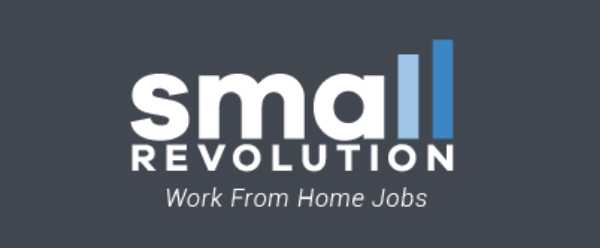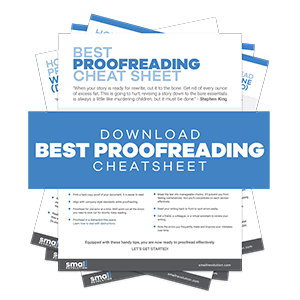Editing is a lucrative field, and it’s expanding at a rapid rate.
Google is learning to recognize quality content, and companies are taking notice. Excellent writing is becoming crucial for meeting search engine standards and gaining traction in the saturated online marketplace.
That’s where editors come into play.
As an expert on all things writing, you’re the mediator between a company and a profitable online presence. It’s on you to ensure quality, and online businesses are willing to pay big money to make that happen.
The profitable nature of editing makes the field pretty competitive, though.
Applicants need a certain skill set to differentiate themselves from other candidates. It doesn’t have to be industry experience either—companies are more than willing to hire budding rookies with the right traits for the job.
We at Small Revolution are here to help. Our learning platform focuses on the competencies necessary to thrive in remote work fields. In practical terms, we strive to help people achieve something along the lines of:
I am a fresh graduate who loves to explore something more interesting in working online. With that, I encounter things that might improve my knowledge with this kind of work. The things that I enjoy the most, being an online worker I can continue my learning and enrich my knowledge, also all the benefits that I can get through this. I am living with my family and as a breadwinner, I have a big responsibility to them so working online helps me to sustain all their needs.
Analiza
We believe that remote work success starts with a certain cluster of essential skills, and today we’re sharing five that apply to editors. We’ll briefly touch upon ways to develop these skills before sending out that application—you’ll find the details in our learning community.
1: Grammar Skills

Technically, any English speaker can write. However, not everybody can write well, which introduces the necessity for professionals. Editors are one step above those able to write, with an eye for detail and a strong grasp of grammar rules that might’ve eluded the writer.
Proofreading is a part of your job description, and it includes making sure that the following aspects of any text are spotless:
- Word choice
- Word order
- Spelling
- Punctuation
- Tense and aspect
- Contractions
- Determiners
Most proofreading software is capable of basic corrections, but grammar rules aren’t always set in stone. Perhaps the writer used a strange word for effect or made intentional errors to convey status. An automated tool can’t tell the difference, but you can.
How to practice these skills: You need a good command of the English language. Revise grammar rules you find confusing (even as a native speaker). You can also try checking friends’ work to exercise your proofreading muscles.
2: Content Organization Skills
Content organization ensures that a piece of writing makes sense to an audience. An outline defines how information is presented and how you’ll move from one idea to the next. This process precedes writing, but it’s just as important to grasp when editing.
While most of us can tell when something’s off with a text, it takes know-how to pinpoint what that is. If dealing with a commercial text, here’s how you can approach this task:
- What ideas does the title include? Does the piece cover every aspect?
- What are the main points and takeaways?
- Does the text call for social or scientific proof? Is there enough supporting information?
Starting with big ideas and working your way down to individual paragraphs will help you nail the structure (or correct a writer who hasn’t).
How to practice these skills: If you’re already a writer, try producing outlines for your content. Get familiar with the hallmarks of commercial writing—hooks, simple points and supporting information, persuasion—and incorporate those ideas into your plan.
3: Research Skills
As an editor, you’ll make judgments about unfamiliar topics. You might be in an even more challenging position than your fellow writers, who have to do in-depth topic research before diving into content production.
It’s on you to ensure that no incorrect or misleading information passes through. As a rule of thumb, an editor will check the following while going through a finished document:
- Any factual information (years, figures, definitions)
- Sources and whether they match the stated information
- Source reputability and any potential biases
- Statistics and their interpretation
How to practice this skill: Familiarize yourself with the sources you’ll be using, whether they’re government sites or academic papers. Read up on critical thinking and media analysis, especially if you work with opinion pieces.

4: Word Processing Software Expertise
We’ve discussed portfolios for copywriters, and in reality, portfolios for content editors look very similar. You’ll need to provide proof of your skills, whether it’s practical job experience or proficiency with various aspects of the job.
The latter is especially useful for novices. Prior familiarity reduces the number of hours your new employer has to spend training you. You’ll also make your own life easier by exploring a platform before using it for the first time under a deadline.
The table below outlines the most common software you’ll encounter as an editor.
| Software | Best for |
| Google Docs/Microsoft Office Word | Simple document production and editing, easy collaboration |
| Scrivener | Fiction and non-fiction writing, manuscript production |
| LibreOffice | Document, spreadsheet, and diagram production |
| Latex | Academic, scientific, and technical document production |
Familiarity with common editing tools used for commercial purposes is another skill you can use to your advantage. These include:
- Grammar checkers
- Search engine optimization tools
- Plagiarism checkers
- Formatting tools
- Publishing tools
How to practice these skills: Read and watch practical guides, download programs, and click around. Most modern software tools are intuitive enough to master without special training.
5: Cooperation & Collaboration
Remote work includes some collaboration between team members and the organization, but for the most part, you can do your own thing. Editing, on the other hand, is always collaborative.
Every change you make has to come with an explanation—it’s the only way to help the writer grow. You should also summarize your general impression after working through a piece and make suggestions for improvement.
How to practice these skills: You’ll need to develop emotional intelligence and good business communication. Active listening and feedback loops help smoothen these interactions.
Editor Job Skills for a Successful Remote Career

Commercial editing is a precise profession that includes both general writing principles and the particulars of your field. It’s also dynamic, constantly changing to keep up with the ever-growing market.
A level of adaptability and fast adoption of new information is necessary for you to succeed in this career. However, the five skills we outlined above are constants.
Learn the ropes before applying for positions to set yourself up for success. You’ll hone particular skills with time, but these essentials ensure that you won’t be grasping for straws from the get-go. Instead, you’ll thrive during the application process and beyond.
Check our comprehensive list of online proofreading positions to motivate yourself for career development. Sign up for class and start building your skills today.


